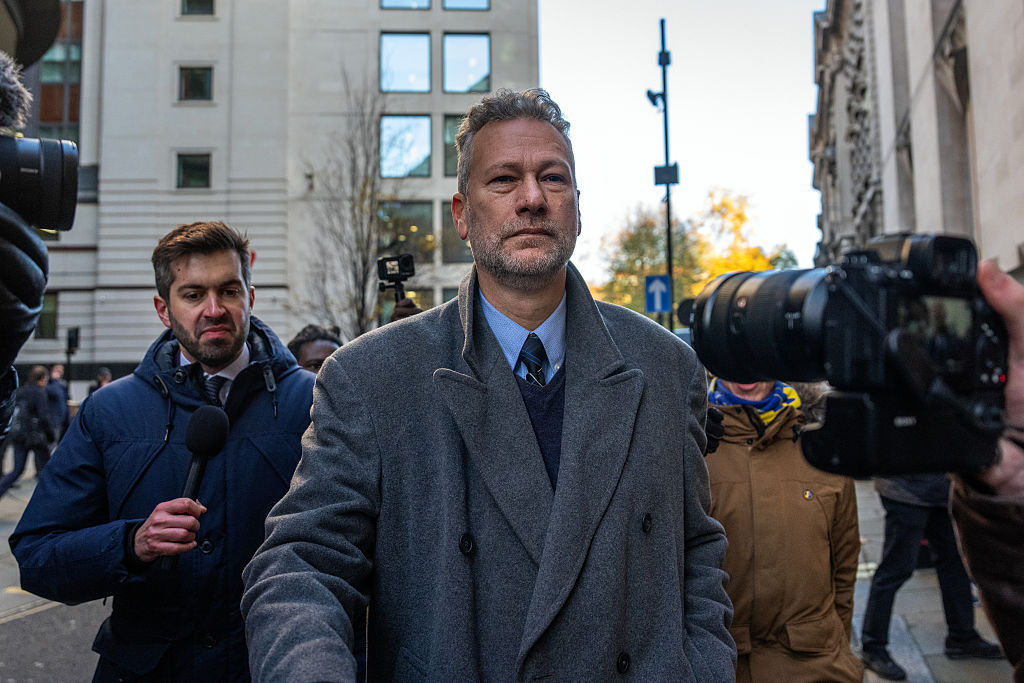Was 52-year old Anglesey man Nathan Gill, a member of the European parliament, taking money from the Kremlin, or just from a corrupt Ukrainian oligarch? We may never know. But on Friday Gill was sent down for ten-and-a-half years at the Old Bailey, after he was found guilty of accepting bribes from Ukrainian operatives in exchange for delivering scripted speeches in the European Parliament defending pro-Kremlin TV channels and hosting an event for Viktor Medvedchuk, a close ally of Vladimir Putin.
Gill sat in Strasbourg as an MEP for North Wales representing the Brexit party, and was later leader of the Welsh branch of Reform UK. Party leader Nigel Farage, who campaigned alongside Gill and once described him as an ‘honest, decent and honourable man’ has since distanced himself from his former colleague. In a statement Reform said Gill’s actions were ‘reprehensible, treasonous and unforgivable.’
It’s not clear from the evidence presented in the High Court whether Gill’s recruitment was run by Russia’s Federal Security Service (FSB) or whether it was a private, freelance operation mounted by Ukrainian oligarch Viktor Medvedchuk. For nearly two decades Medvedchuk had championed pro-Russian causes in Kyiv, owned several Russian-language TV stations and had served as a member of parliament and chief of staff to former Ukrainian president Leonid Kuchma. Medvedchuk hosted Putin in his lavish Crimean mansion and his daughter Darya is Putin’s goddaughter. He was the Kremlin’s leading candidate to replace Volodimir Zelensky had Putin’s 2022 invasion succeeded in toppling the Kyiv government. Arrested after trying to flee Ukraine, Medvedchuk was exchanged in a prisoner swap and now reportedly lives in luxury outside Moscow.
According to Mark Heywood KC, prosecuting, Gill was approached in 2018 by former Ukrainian member of parliament Oleg Voloshyn, 44, a Medvedchuk associate, and agreed to host an event for Medvedchuk in the European Parliament. Gill, tasked with drumming up attendees, texted Voloshyn to confirm that he could ‘drag a few in to attend.’ As the relationship developed Gill made pro-Russian media statements and parliamentary speeches and tabled motions. He also persuaded four other MEPs – three Britons and one German – to give interviews to the Medvedchuk-allied 112 Ukraine TV channel. In exchange for these services Gill received some £40,000, Heywood told the High Court, enclosed in greetings cards. Voloshyn told Gill that he would ‘definitely be fairly rewarded’ with ‘a small sack of paper gifts for you.’ Packets of cash found at Gill’s house were also produced as evidence.
Gill was arrested at Manchester airport in September 2021 and his phone found to be full of grossly incriminating texts. One message included a suggestion that Gill ‘directly called upon our president [Zelensky] to defend Independent TV stations from unacceptable political pressure.’ In another message to Gill Voloshyn speaks of ‘promised Xmas gifts and requested five more postcards for your kind help.’
Such sloppy tradecraft seems to put the Gill operation in the realm of run-of-the mill bribery of the sort that has been standard operating procedure in Ukrainian politics for decades rather than a professional operation run by the FSB. One would expect handlers from the FSB to be far more discreet about comms of the kind Gill was foolish enough to leave on his phone. More, the value of recruiting a sitting member of the European Parliament would presumably lie in recruiting others and moving the agent up the party and possibly later government hierarchy rather than blatantly exposing himself by spouting blatant Kremlin talking points. And if this was indeed a Kremlin operation then Russian taxpayers should be very indignant to hear that their agent was handled so sloppily and their government’s money so unwisely spent.
We British taxpayers should, for our part, be horrified that a member of our political class, however humble, has turned out to be a traitor for hire. On the other hand, experience has shown that the British establishment is a ridiculously easy target for Russian intelligence.
Such cases as Gill’s seem to be drawn more from the bumbling world of Mick Herron’s Slow Horses than the high-stakes espionage universe of le Carre’s Tinker Tailor. But out in the real world there is no doubt that Russian intelligence is actively targeting Britain’s institutions. And its operations – from the Litvinenko and Skripal poisonings to employing freelance arsonists to target warehouses of aid destined for Ukraine – are in deadly earnest. Most chilling of all, Gill was busted after some very lax tradecraft and idiotically poor handling. Russia’s true agents are doubtless far more careful (not to mention considerably better paid). And the best espionage operations are the ones you never hear about.








Comments